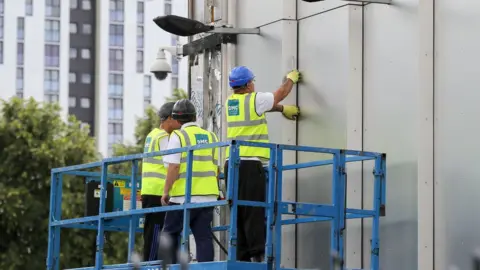Grenfell: Government defeated on fire safety costs plan
 Getty Images
Getty ImagesThe government has been defeated for a third time in the Lords over its plans for who pays for fire safety work on buildings in light of the Grenfell tragedy.
Peers changed the Fire Safety Bill again to prevent owners of blocks of flats passing the costs for remedial work on to leaseholders.
They argued a government grants and loan scheme should be in place first.
The government says the changes are "inappropriate and unworkable".
Peers voted by a majority of 86 to reinsert provisions to shield residents from having to foot the bill for safety improvements.
A previous attempt by them to introduce the changes was rejected by MPs in March.
The Fire Safety Bill was brought forward to strengthen regulations following the Grenfell Tower fire in 2017 which killed 72 people.
There has been an intense debate about who should pick up the costs for works such as changes to emergency exits, after inspections found many other flats were covered in combustible cladding.
Thousands of leaseholders have faced huge bills amid warnings of financial ruin and mental health emergencies.
"Unprecedented" support
Housing, Communities and Local Government minister, Lord Greenhalgh, opened the debate by telling peers it was "time to accept the will of the democratic chamber".
He said MPs had twice rejected the moves to change the legislation and he warned it would "ultimately cost lives" if the legislation was further delayed.
He said ministers had brought forward an "unprecedented" package of support to "alleviate the burden" on leaseholders.
In February, the government announced it was putting £3.5bn towards removing unsafe cladding from buildings more than 18m high - on top of £1.6bn for cladding removal announced last year.
It said flat owners in lower-rise blocks would be able to access loans to cover repair work and repayments would be capped at £50 a month.
But the schemes - which take the form of grants and loans - have not been introduced yet and flat owners say they still face costs of up to £50,000 for other works and insurance premiums.
"Desperate dilemmas"
The Bishop of St Albans, the Right Reverend Dr Alan Smith, who brought forward the amendment, said the government's current offer was not acceptable.
He said the prime minister had been able to "rearrange his busy diary and intervene personally" to solve the problem in English football but there was no such "radical action" for the hundreds of thousands of people facing "desperate dilemmas".
He said he knew it was a "nuisance" to once again disagree with the government's plans as the bill overall was "good" but without changes, people could "within months face very large bills".
The bishop said there had been no assurances to prevent the costs being passed to leaseholders until the government's support scheme was operational and other historic fire safety defects were not covered by the plans.
"In the absence of an adequate plan or scheme to properly and fairly deal with the issues of remediation and the consequences of this bill - it's my duty to stand up," he added.
For Labour, Lord Kennedy of Southwark argued the government had "neither listened nor recognised the plight of the people trapped in their homes".
"It's not good enough. We must stand with the innocent victims - the leaseholders and the tenants.
"It is a disgraceful, monumental scandal and the government cannot be let off the hook," he said.
The Liberal Democrat peer, Lady Pinnock, accused ministers of "trying to defend the indefensible", with "innocent victims" who had "done everything right and nothing wrong" facing bankruptcy.
She said the problem could only be solved with "upfront funding from the government, "which could then be recouped from developers, construction firms and manufacturers.
Lord Greenhalgh said the idea ministers were "unleashing a torrent of issues" for residents was "overstated" and details of the financial support schemes would be published "very shortly".
The bill will now return to the Commons again in what is known as parliamentary "ping pong" - the term used when legislation goes back and forth between the Commons and Lords as they reject each others' changes.
